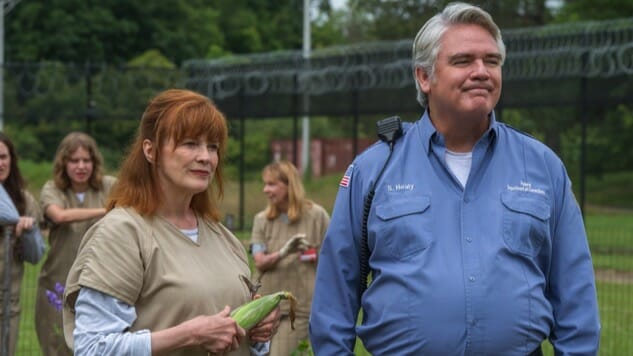“The Myth of Sisyphus” is the Perfect Analogy for Orange is the New Black‘s Litchfield Prison
(Episode 4.03, "(Don't) Say Anything" and Episode 4.04, "Doctor Psycho")
TV Reviews Orange Is the New Black
This review contains spoilers from episodes three and four of Orange is the New Black, Season Four.
In “The Myth of Sisyphus,” as told by Suzanne Warren and Albert Camus, the highwayman of the title is condemned forever to roll a boulder to the top of a mountain, only to watch it roll back to the base, again and again and again: ”[T]hat unspeakable penalty,” per the latter, “in which the whole being is exerted toward accomplishing nothing.” This is the lesson of Litchfield, too. Here, time twists in strange knots, slowing and speeding up without warning. Sophia loses track of it, broken by the torture of life in the SHU; Aleida, eligible for early release, grasps hold of it, pessimistic about her prospects in freedom. Most simply relent to its passage. Here, there is only the next day, and the next, and the next.
”(Don’t) Say Anything” and “Doctor Psycho” are both run through with the pain of the futile endeavor, but as Camus himself suggests, this doesn’t eliminate joy. Taystee revels in her new position as Caputo’s personal assistant, and proves herself as capable as ever. (Her impulse to create a checklist of the work to be done on the guards’ cabins is a smart one, whatever insults Piscatella might throw her way.) Morello finds a solution to her growing estrangement from Vinnie, and enjoys an orgasm in the process. (The pair’s face-to-face “phone sex,” in front of families in the visitation room, is satisfying—to the newlyweds—and absolutely hilarious—to me.) In short, as Orange Is the New Black turns further toward drama, the inmates continue, where they can, to reject despair. Even Sophia, weary and gaunt, refuses to give in, flooding her cell and setting it aflame. “Tell Caputo to go fuck himself,” she says. “I’m just getting started.”
This is the “revolt” that Camus praises in “The Myth of Sisyphus, and the flashbacks in ”(Don’t) Say Anything” and “Doctor Psycho” point, respectively, to the consequences of embracing and forsaking the effort to change, even if that effort is fruitless. In the former, Soso, recklessly naive, repeats the same mistake she’s been making since her days petitioning against big-box stores: She leans on her politics for personal ends, and thus stumbles into a host of hurtful assumptions. Focusing on words more than deeds (”’The other one percent’ is such a great hashtag,” she declares), Soso imposes the categorical on the subtle, the straightforward on the complex, to the point that her “progressivism” often reads as prejudice. For each step forward—defending herself as a bisexual to Litchfield’s lesbians; listening to a registered sex offender with an open heart—there’s a giant leap back—describing Poussey as the daughter of a drug addict; lying to her ex-boyfriend that the man she met was a dangerous pedophile simply to draw a point.
On the surface, Healy is a similar figure, flubbing each well-intentioned gesture by framing himself at the center of it, but Orange Is the New Black cannily deconstructs the comparison as “Doctor Psycho” unspools. Soso slips into her old habit of saying anything to earn others’ approval, but she fights the urge as well, a flawed Sisyphus of the cellblock. Healy prefers to sulk at the foot of Mount Misogyny, unable to brook the notion that he’s not The Nice Guy. Over and over—in his treatment of Red, in the excruciating aftermath of his date, in his decision to have Judy teach a cooking class, in his brief meal with the destitute woman he mistakes for his mother—he uses the smallest acts of “kindness” to pressure women to do what he wants, and when they refuse he punishes them for it. In his expectant posturing and insistent control, he’s a walking reminder of Margaret Atwood’s famous words: “Men are afraid that women will laugh at them. Women are afraid that men will kill them.”
Even as Piper and Maria wrangle over their competing dirty-panty operations, and Alex and Frieda bring Red in “to consult” on the issue of Lolly’s loose lips—subplots that involve, broadly speaking, women behaving badly—Orange Is the New Black directs its energies toward painting Healy as part of a much larger problem. Like Coates insisting that he couldn’t have raped Pennsatucky because he told her he loved her, Healy’s dismissive “That’s how women talk,” when Caputo removes him as Judy’s caseworker, reveals the depths of his blindness on this front, exacerbated by his position of authority in the prison ecosystem. “With responsibility comes great power,” Suzanne tells Taystee. “Isn’t it the other way around?” “No. Think about it.”
For Litchfield’s inmates, then, to “revolt,” in ways large and small, is the only option in the face of the futile. Pinch panties from the prison to earn more than subhuman wages. Remind the social worker “there’s no such thing as a consensual relationship between a prisoner and a guard.” Wear a striped blazer to work. Start a fire. Scream. As Camus writes, “the struggle itself toward the heights is enough to fill a man’s heart,” but in Orange is the New Black it’s women who wage the struggle, and the fullest hearts are theirs alone.
Other thoughts and quotes from these episodes:
Our first glimpse of Nicky!
Gloria doesn’t miss a trick, stepping in to encourage Aleida to prepare for life on the outside as soon as she notices something’s wrong: “I’m like Columbo, but with two real eyes and a better ass.”
“Winter is coming, bitches!”—Taystee
Matt Brennan is a film and TV critic whose writing has appeared in LA Weekly, Indiewire, Paste, Slant, The Week, Flavorwire, Deadspin, and Slate, among other publications. He lives in New Orleans and tweets about what he’s watching @thefilmgoer.